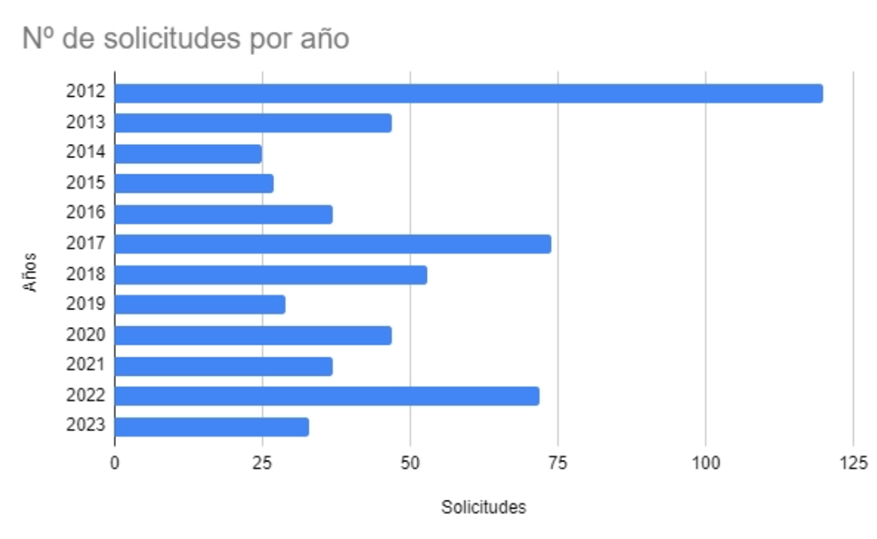 In common with a growing list of EU Member States, Spain operates an ongoing domain blocking program with the aim of reducing traffic to pirate sites.
In common with a growing list of EU Member States, Spain operates an ongoing domain blocking program with the aim of reducing traffic to pirate sites.
Amendments to Spain’s Copyright Act (Law No. 2/2011) led to the formation of an administrative body known as the Second Section of the Intellectual Property Commission (S2CPI).
Launched in 2012 under Spain’s Ministry of Culture and Sports, S2CPI has the authority to issue instructions which require local internet service providers to restrict access to pirate sites. The process begins when rightsholders file an application with S2CPI with a request to block a specific domain (or domains) directly linked to the unlawful distribution of their copyright works.

In 2012, the Commission received 362 applications, a record that still stands today more than a decade later. The significant caveat is that 250 of those applications were abandoned after failing to meet filing requirements.
Spain’s Blocking Program: Latest Figures
S2CPI’s quarterly report published this week reveals that since its inception, 843 applications for site blocking were filed at S2CPI but for reasons including errors, insufficient grounds for the application, and sites suddenly disappearing, 328 applications were closed. Just 15 applications have been officially rejected since 2012, a third of those during the last three months.
The full list of domains blocked following orders from S2CPI is fairly lengthy and as the sample below shows, mostly focused on Spanish language pirate sites. The Pirate Bay’s current main domain makes an inevitable appearance, as does its .se variant, despite its confiscation by Swedish authorities several years ago.

Along with EU Member States Germany, Portugal and Denmark, Spanish stakeholders and local internet service providers established a voluntary code of conduct which promotes self-regulation between the creative industries and the telecoms sector. A key aim is to ensure that administrative blocking is effective, particularly in respect of persistent pirate sites subject to existing blocking instructions.
S2CPI reports that by the end of June 2023, parties to the agreement were sending around 100 queries, generally on a weekly basis, relating to more than 637 domains which in turn had deployed almost 2,000 sub-domains, presumably to avoid blocking.
Under the terms of the voluntary code, all were blocked by Spain’s internet service providers “using the most appropriate technical measures at all times to prevent or significantly reduce, in a real and effective manner, access to these infringing websites, which has meant the impossibility of access to millions of works (books, musical works, video games, audiovisual works, etc.) protected by IPR, made available illegally on such infringing websites.”
Other Measures to Restrict Pirate Sites
S2CPI reports that in line with local law, requests have been filed with local domain registry Red.es to cancel .es domains when they are used by pirate sites subjected to blocking. To date, a total of 15 domains have been canceled following S2CPI requests, the administrative body reports.
In numerous jurisdictions, the blocking of a pirate website is interpreted as a green light to place the platform under increased pressure, often by attempting to restrict access to both current and potential business partners, advertisers in particular.
In 2020, the Ministry of Culture and Sport signed a memorandum of understanding which saw Spain join WIPO ALERT, a platform operated by the World Intellectual Property Organization (WIPO). Through a global pirate site ‘blacklist’ comprised of domains submitted by countries like Spain, advertisers and agencies are encouraged to boycott WIPO-Alert-listed domains and conduct their business elsewhere.
WIPO declines to publish a full list of domains but does offer an online tool which allows the curious to discover whether a specific domain is on the global list. That list currently comprises national ‘infringing website lists’ submitted by Italy, Russia, Spain, Peru, Ecuador, Lithuania, Greece, and the United Kingdom.
S2CPI publishes Spain’s list of infringing domains in its quarterly reports, the latest of which is available here (pdf). There are almost 500 domains on the current list with one site – the now infamous DonTorrent – receiving disproportionate attention, for fairly obvious reasons.






